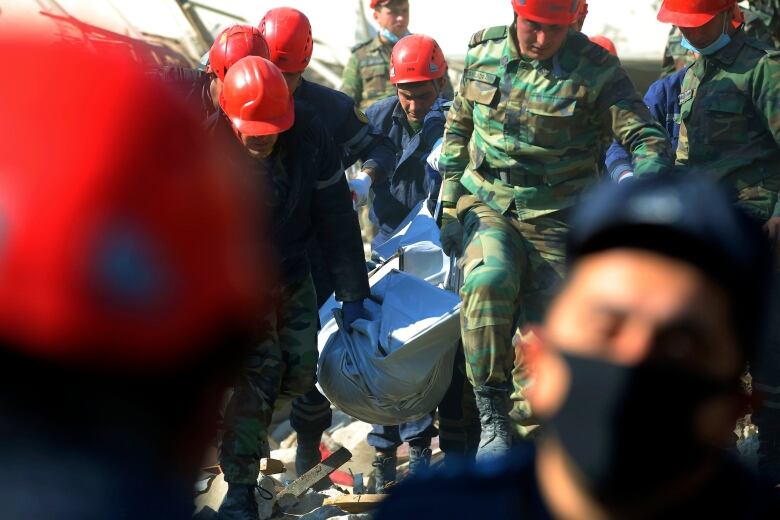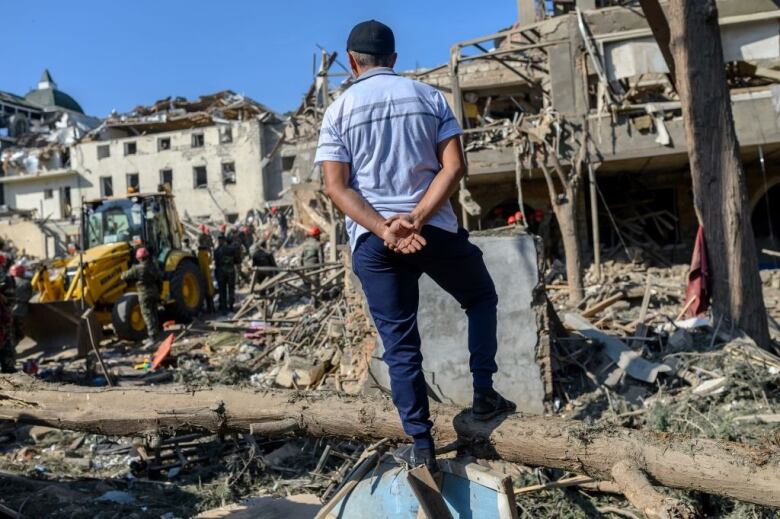Nagorno-Karabakh ceasefire frays as Azerbaijan, Armenia allege attacks
9 civilians killed and more than 30 others wounded, Azerbaijani officials say
Azerbaijan on Sunday accused Armenia of attacking its cities and villages in violation of the ceasefire deal brokered by Russia that seeks to end an outbreak of hostilities in the separatist Nagorno-Karabakh region.
The Azerbaijani Defence Ministry said that Armenian forces shelled villages in the Aghdam, Terter, Aghjabedi and Fizuli regions of Azerbaijan. Azerbaijani authorities earlier accused Armenian forces of firing missiles at Ganja, the country's second largest city, and the city of Mingachevir overnight.
Nine civilians were killed and more than 30 others wounded in Ganja, officials said. Azerbaijani President Ilham Aliyev called the attack on the city "a war crime" and a "gross" violation of the cease-fire on Twitter, promising "a befitting retaliation."
Nagorno-Karabakh's military officials on Sunday denied attacking Ganja and said the territory's army is observing the ceasefire. They said Azerbaijani forces shelled Stepanakert, the region's capital, and other towns during the night in violation of the truce.
The recent bout of fighting between Azerbaijani and Armenian forces started Sept. 27 and left hundreds of people dead in the biggest escalation of the decades-old conflict over Nagorno-Karabakh since a separatist war there ended in 1994. The region lies in Azerbaijan but has been under control of ethnic Armenian forces backed by Armenia.

The foreign ministers of Armenia and Azerbaijan signed a truce in Moscow after Russian President Vladimir Putin had brokered it in a series of calls with President Ilham Aliyev of Azerbaijan and ArmenianPrime Minister Nikol Pashinian.
The ceasefire deal was announced early Saturday, after 10 hours of talks in the Russian capital sponsored by Russian Foreign Minister SergeiLavrov, and took effect at noon Saturday. The deal stipulated that the ceasefire should pave the way for talks on settling the conflict.
If the truce had held, it would have markeda major diplomatic coup for Russia, which has a security pact with Armenia but also cultivated warm ties with Azerbaijan.
However, minutes after the ceasefire took force, both sides accused each other of continuing attacks in violation of the deal.
The situation in the region was "relatively calm" on Sunday morning, according to Nagorno-Karabakh leader Arayik Harutyunyan, with only minor hostilities along the front line. But it was unclear whether the calm would last, he said.

Later Sunday, Armenian Defence Ministry spokesperson Shushan Stepanian reported attacks by Azerbaijani forces on southern and northeastern directions, saying that Nagorno-Karabakh's forces "resolutely suppress all enemy operations."
Nagorno-Karabakh's army in a statement Sunday promised a "disproportionately harsh" response if Azerbaijan "continues to violate the cease-fire." The Azerbaijani Defence Ministry said that "the political and military leadership of Armenia bears the responsibility for the aggravation of the situation in the region."
Azerbaijan's president said in an interview with the Russian RBC news outlet that "if the Armenian side is committed to the cease-fire regime ... the phase of political settlement will begin."













_(720p).jpg)


 OFFICIAL HD MUSIC VIDEO.jpg)
.jpg)



























































































